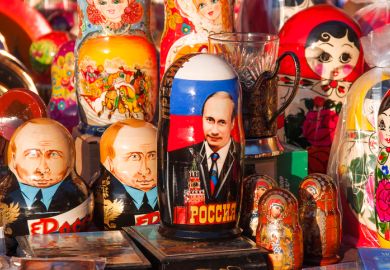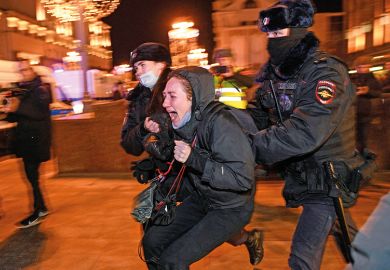After a year of house arrest and more than 30 interrogations by Russian authorities, Armen Aramyan’s guilty verdict on 12 April came as somewhat of a relief.
The 24-year-old editor of one of Russia’s last remaining independent media outlets, the student publication Doxa, has paid a heavy price for speaking freely. His offence? A video that said students should not be afraid to voice their opinions at unsanctioned protests against the detention of opposition leader Alexei Navalny.
Along with three other Doxa editors – Alla Gutnikova, Natasha Tyshkevich and Vladimir Metelkin – Mr Aramyan was found guilty of “involving minors in illegal acts”, in what has been broadly denounced as a baseless charge. They were assigned two years of community service and banned from administering websites for three years, but their period of isolation has ended.
“I was of course relieved to learn that I’ll be freed from house arrest and the ankle monitor will be taken from me,” Mr Aramyan laughed as cars honked in the background, a sign that he is now free to wander Moscow’s streets again.
But he was unequivocal about the judgment, calling the whole episode “absurd”. “It’s a very unjust verdict, it feels like the most harsh part of the punishment was the prosecution itself – in one year of house arrest we were isolated from everything,” he said.
Despite the editors’ official resignation from Doxa at the onset of their trial, the student paper has continued to publish, accomplishing what so many of Russia’s professional media have not: taking a strong stance against the war on Ukraine.
The trial of Doxa editors began in early 2021, more than a year before Russia’s war on Ukraine started. But in recent months, the noose has grown tighter.
“I was working as editor in Doxa before the war, doing the usual stuff editors do, but after the war, it became very dangerous. All of Russian media was censored into stopping publishing – the minority of publications that continue to exist manage because all their journalists left Russia. Many Russians feel like we’re on the brink of a full totalitarian nightmare.”
Doxa, which Mr Aramyan is no longer allowed to edit, is keeping track of the nightmare as it unfolds, reporting on student arrests and violations of their rights. Its newly launched initiative, “Z-Rating” – named in a nod to the infamous letter painted on Russian tanks, which has since become a symbol of the war – tracks instances of oppression by Russian universities, including efforts to silence students and public positions supporting the Kremlin.
Established in 2017 at Moscow’s prestigious Higher School of Economics, the student paper has since been exposing corruption and sexual harassment at Russian universities.
While Doxa continues to function with the help of dozens of student volunteers, other publications have been extinguished. Mr Aramyan worried about what will happen if there is no one left to pick up the baton.
“This feels like a Groundhog Day. It repeats itself each few years – all the old initiatives are dead,” he said.
As for Mr Aramyan, he is now free to go outside, but his future is far from certain.
Last autumn, he was accepted onto a PhD programme in anthropology at UCL, but he is still waiting for a written verdict to understand whether he’ll be able to attend this year.
“I don’t feel that everything is over because this punishment is very unclear, we’re trying to figure out the details.”
To others, the message sent by the Kremlin’s trial of Doxa editors is clear.
“You can’t be safe in Russia, basically, there are no rules – political censorship picks random people in order to create this atmosphere of fear,” he said. “The only way to be safe is to not do anything.”
Register to continue
Why register?
- Registration is free and only takes a moment
- Once registered, you can read 3 articles a month
- Sign up for our newsletter
Subscribe
Or subscribe for unlimited access to:
- Unlimited access to news, views, insights & reviews
- Digital editions
- Digital access to THE’s university and college rankings analysis
Already registered or a current subscriber?








